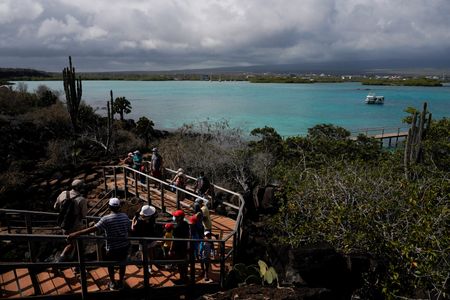 1
1 1
1
By Isla Binnie
NEW YORK (Reuters) – Nuveen LLC is considering buying a big chunk of Ecuador’s new “blue bond” to help fund conservation of its wildlife-rich Galapagos Islands, with access to measurable impact data a key factor in the decision, one of the asset manager’s executives told Reuters.
Ecuador sold the bond worth $656 million last week and committed to channel $12 million each year to protect species and ecosystems in the Galapagos, home to giant tortoises and some other species found nowhere else on Earth.
The deal followed smaller such debt issues including from Seychelles and Barbados, which Nuveen bought into, becoming one of the world’s biggest buyers of eco-friendly bonds.
“We are currently evaluating it,” Nuveen’s head of environmental, social and governance (ESG) and impact debt investments Stephen Liberatore said in an interview.
Liberatore said Nuveen needed to decide whether Ecuador’s bond was “attractive from a total return perspective”.
The next key aspect is receiving reliable data on the environmental impact of its investment. Liberatore said the $1.1 trillion asset manager had spoken to political risk insurer International Development Finance Corp (DFC) and underwriting bank Credit Suisse, and would now talk to Ecuadorean officials.
Credit Suisse has already purchased the transaction, but Nuveen would buy it as though it were a new issue, Liberatore said.
The new bond comes with a lower cost of debt than the standard commercial rate in exchange for commitments to protect one of the world’s most biodiverse areas. It is also backed by a guarantee from the Inter-American Development Bank designed to cover repayment risk.
As a result its interest rate is 5.645%, compared to as much as 31% for a 2030 bond. Long-running political turmoil that culminated with President Guillermo Lasso calling this week for a snap election has lifted Ecuador’s borrowing costs.
Liberatore declined to say how much money Nuveen could invest if it decided to proceed, but said the firm generally seeks 10% or more of a large transaction.
The Seychelles, where Nuveen invested in 2018, is using proceeds from its own blue bond for cash grants to provide better equipment for the fishing industry and working on building more efficient processing plants for the catch, Liberatore said.
Asked about an opinion issued by Moody’s ratings agency on Tuesday that the operation constituted a distressed debt exchange and therefore a default, Liberatore said: “I don’t see how it would be considered a default because Ecuador continues to pay.”
Moody’s had said the repurchase of outstanding debt that was done as part of the swap had occurred at “deeply distressed prices”, meaning a loss to investors compared to the original promise of the bond contracts.
(Reporting by Isla Binnie, editing by Rodrigo Campos and David Gregorio)